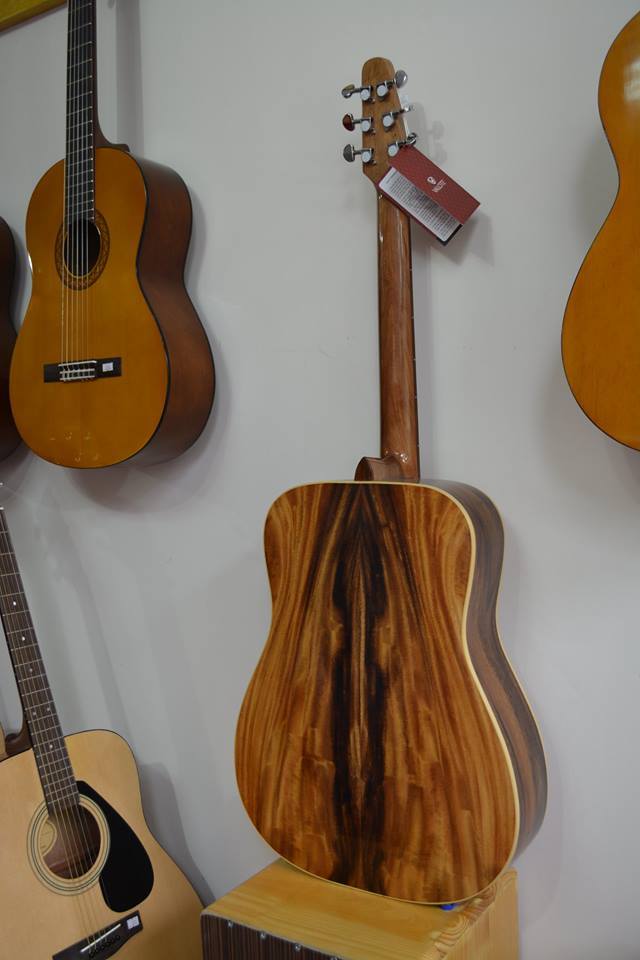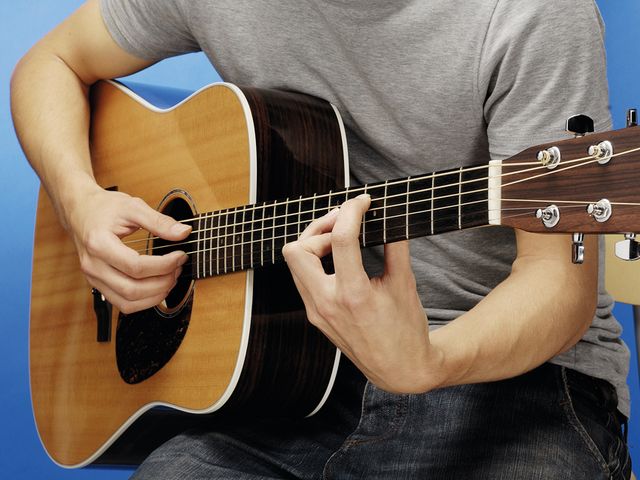Learning Guitar - Acoustic or Electric?
Of all the e-mail I receive, by far the most common question I'm asked is "Which is better to learn on... an electric guitar, or an acoustic guitar?" The answer to that question, despite what many would lead you to believe, is a little more complicated than "electric is best", or "acoustic is best". To find an answer for this question yourself, let's begin by learning a little bit about both electric and acoustic guitars, and what makes them different.

Guitar Valote
This is the instrument most people think of when they think "guitar". An acoustic guitar is hollow, and almost always has a "sound hole" - a round hole in the face of the guitar. Acoustic guitars almost always have six strings. When you strike the strings of an acoustic guitar, the instrument produces a rather loud sound. Although acoustic guitars are often associated with folk music, and "mellow" music in general, they are in truth in all styles of music, from country to blues to heavy metal.
A "classical guitar" looks quite similar to an "acoustic guitar", and is indeed still an acoustic instrument, but it has several distinct differences. Standard acoustic guitars have six strings made of steel, whereas classical guitars have six strings, three of which are nylon. This produces a sound quite different from an acoustic guitar. The neck of the guitar is also much broader on most classical guitars. I'll go out on a limb and say that unless you are interested in focusing on classical music, this style of guitar probably shouldn't be your primary choice for a first instrument.

Electric guitars have a few more bells and whistles than acoustics. Most electric guitars are not hollow, thus when you strike the strings, the sound produced is very quiet. In order to project the sound of an electric guitar, a guitar amplifier is needed. Generally, people find electric guitars to be a little more confusing than acoustic guitars - there are more knobs and buttons to deal with, and there are also a few more things that can go wrong.
Electric guitars are generally much easier to play than acoustic guitars. The strings are lighter, and easier to press down. The sore fingers that many novices experience when learning on an acoustic guitar generally aren't nearly as much of an issue when learning on electric guitar.
Electric guitars have a different role in music than acoustic guitars. Whereas acoustic guitars are often used to strum chords to many songs, electrics are used to play "guitar leads" as well as chords.
Probably the most important consideration, when choosing what type of guitar to learn on, is what type of music will be played on the instrument. If you're a fan of rock music, and want to learn to play rock guitar, starting on electric guitar is a logical choice. If, however, you're a fan of acoustic music, and want to learn to strum your favorite songs, an acoustic guitar is probably best for you. The importance of the above philosophy can't be stressed enough. If you get stuck with the wrong type of guitar, you're going to have much less motivation to pick it up and play it regularly.
Note to parents: this same principle applies when picking out a guitar for your child. Try to realistically assess what they'dlike best, as opposed to what you'dlike them to play. Their progress will be noticably better when playing a guitar they like

Ease of Learning
Depending on your personality type, this might either play a major factor in deciding which guitar to start on, or might be irrelevant. Some people find if they don't see results quickly, they get discouraged, and lose interest in playing guitar altogether. If you think you (or the person you're buying for) are one of those people, an electric guitar is probably the instrument to start on. Electric guitars have smaller bodies, smaller necks, and it's much easier to press down the strings. Essentially, you can start playing the *basics* of guitar much more quickly and easily on an electric guitar, than you can on an acoustic. Having said that, there are a few knobs and buttons on an electric guitar that can complicate using it somewhat.
Budget Considerations
Understandably, paying a whole lot for a first guitar isn't very desirable, especially if you're not even sure if playing guitar is something you (or whomever you're buying for) will stick with. For this reason, acoustic guitars are more often the choice for a first instrument, since they tend to be slightly less expensive. Electric guitars require the purchase of an amplifier, and a guitar cable, so they can end up costing a little more. If you want to learn on an electric guitar, but budget is a serious issue, many guitar stores offer starter electric guitar/amp packages at very reasonable prices.
Now I've given you some things to consider, it's time for you to decide which type of guitar is best suited for you, or for whomever you're buying for. Let's summarize - if the person in question frustrates easily, or listens to and wants to play "hard rock" music, definitely think electric guitar. If, however, the person in question wants to learn songs to sing along to, and can handle a slightly steeper learning curve, then an acoustic guitar might be in order.
Once you've made a decision, take a look at the following page for a few recommendations on specific guitars to buy.
Making the Decision
Let's forget about electric vs. acoustic for a moment. One of the most valuable investments a new guitarist can make is in a guitar stand. Keeping your guitar out of it's case, in plain view at all times, is tremendously important - you'll find yourself playing MUCH more. If you decide on an electric guitar, you might even consider leaving the cord in the guitar, plugged into the amplifier. That way, you can simply pick up the guitar, flick the amp on, and begin playing.
And now, the moment you've all been waiting for. I hesitate somewhat in recommending specific guitars, because even guitars that are the same make and model vary greatly from instrument to instrument. Having said that, here are a few specific models of guitars that I've found to be almost uniformly well constructed, while still having an excellent dollar-value. Although there are hundreds of guitars which would make fine beginner instruments, the following are a few I've had some experience in playing.
Valote
( collectibles: guitar.about )